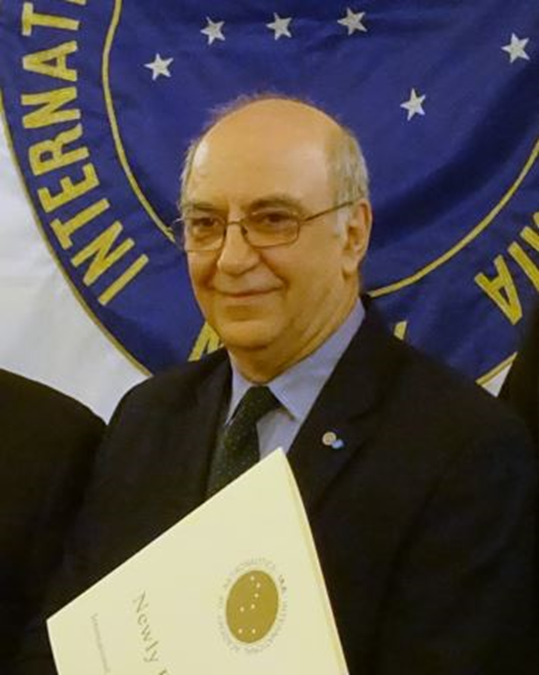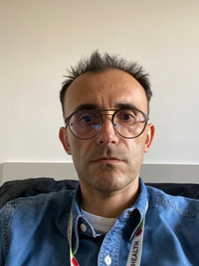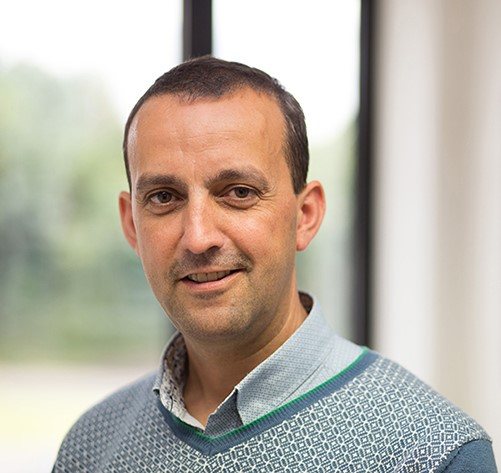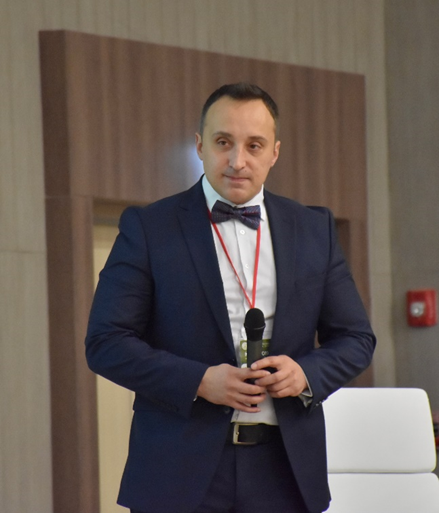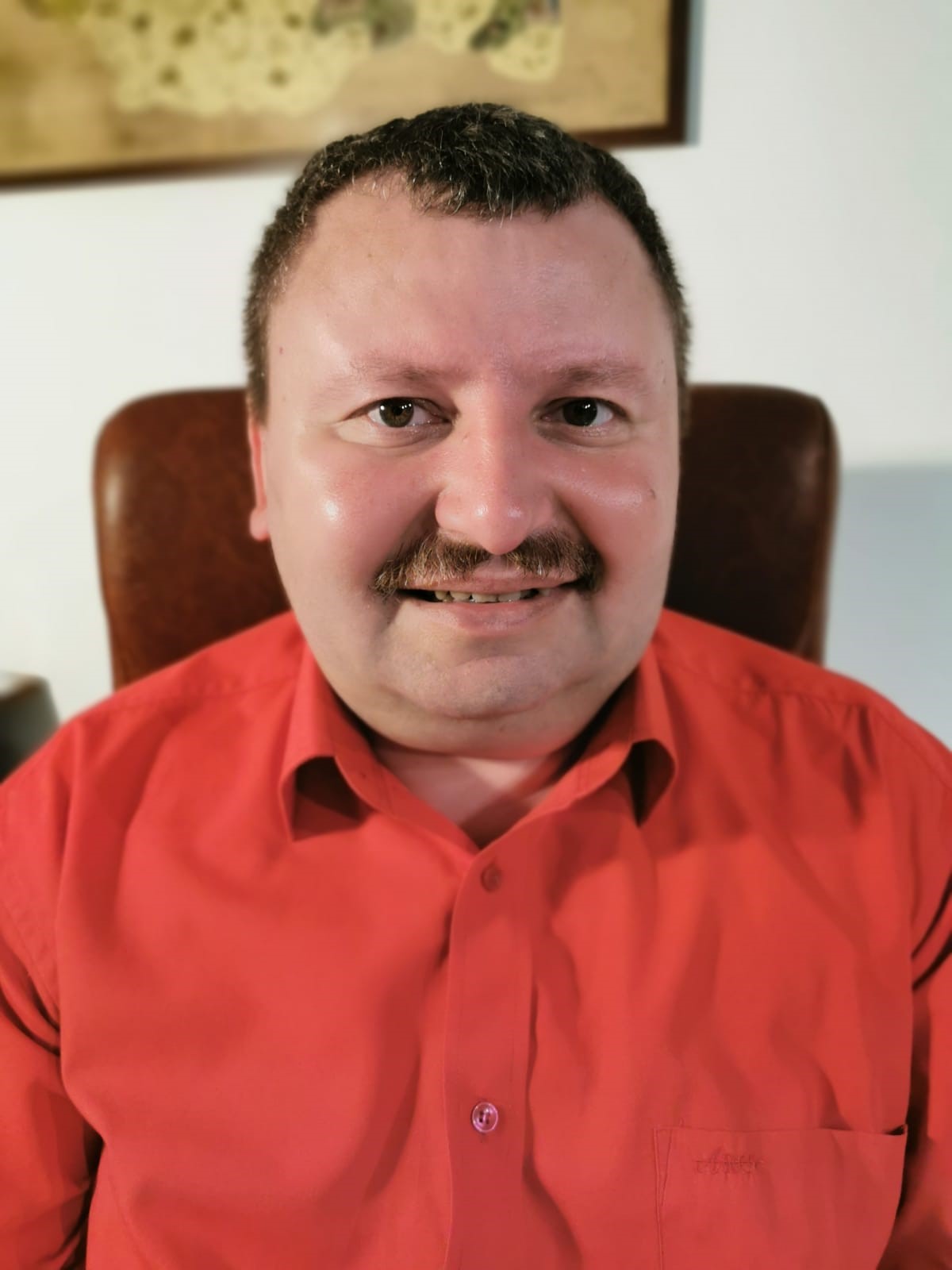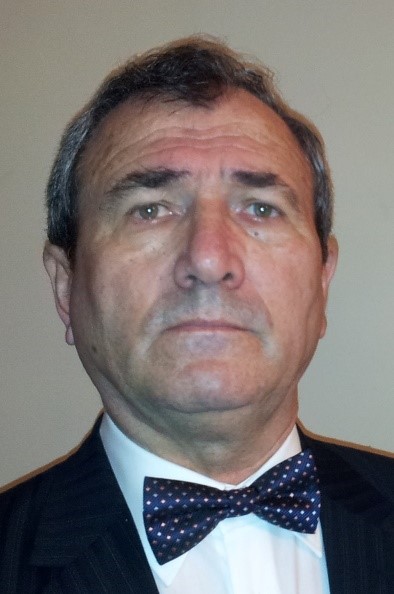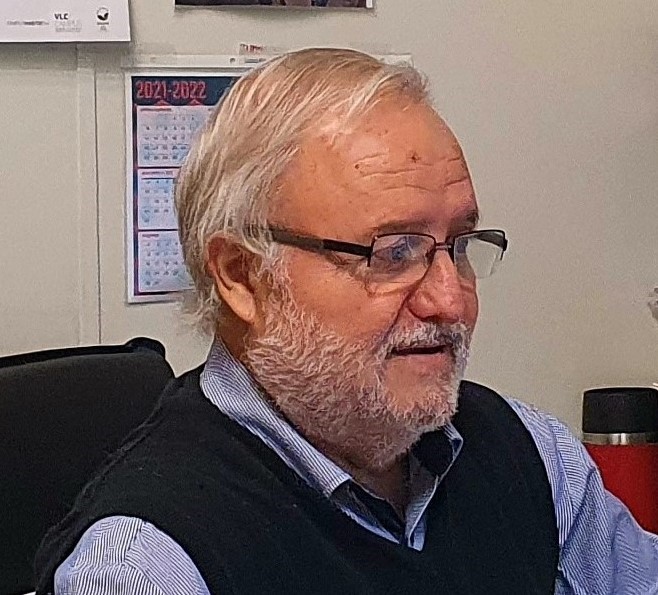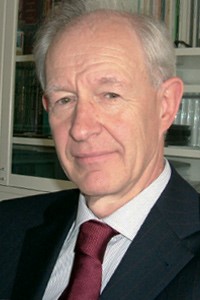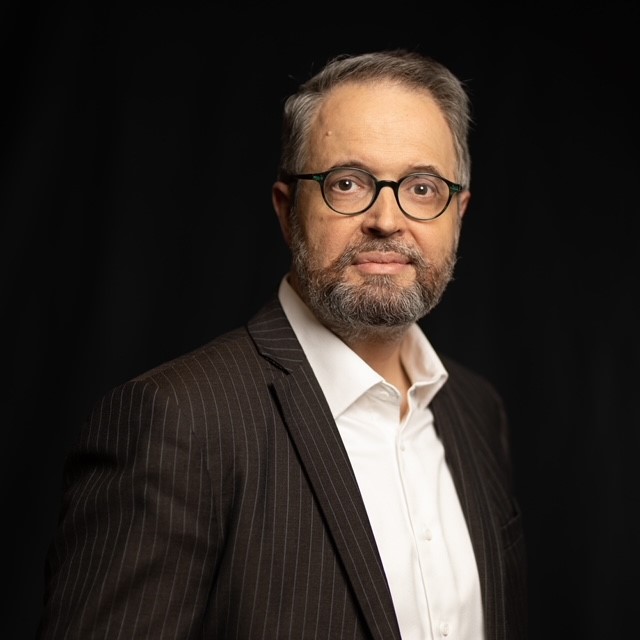|
Prof. dr. Alexandru Badea |
Prof. dr. Alexandru Badea is the Head of the Space Applications Department of the Romanian Space Agency and full Professor (ret.) at the University of Agronomic Sciences and Veterinary Medicine of Bucharest (USAMV B), Faculty of Land Reclamation and Environmental Engineering (FIFIM). He has a PhD degree in Geography (2000) from the University of Bucharest, a DESS Diploma in Remote Sensing from the University Pierre et Marie Curie-Paris VI & GDTA Toulouse (1991), and a Bachelor’s degree in Geodesy from the Technical University of Civil Engineering Bucharest (1980). He has a long career in space applications, particularly in remote sensing and GNSS applications for agriculture and environment. Since 1992, he led many international projects financed by EU, UN – FAO and from private sources: EU Monitoring Agriculture with Remote Sensing MARS (pilot project 1994), EU Phare Crop Information System I Project (1996 - 1998), EU Phare Regional MERA Project (ZZ9211/0502). Prof. Badea was assigned by FAO to coordinate the technical-scientific part of the projects LCCS TCP/AZE/8921(A) (1999 - 2001) and TCP/MOL/2903-3001(2003 - 2005), and was appointed national project manager/director of the similar project TCP/ROM/2901 carried out between 2002 and 2004 in Romania. He is the Head of the Romanian Delegation in the Programme Board for Earth Observation (PB-EO) at the European Space Agency and national delegate at the United Nations Committee on the Peaceful Uses of Outer Space (UN-COPUOS). Mr. Badea is the President of the Romanian Society of Photogrammetry and Remote Sensing since 2018 and Associate Member of the Committee on Space Research (COSPAR). In recognition of his professional activity, in 2017 he was elected Full Member of the International Academy of Astronautics (IAA).
Presentation title: A model of collaborative thematic development of educational programs in the field of geomatics |
|
Prof. univ. dr. Emanuel Vamanu |
Emanuel Vamanu is a professor at the Faculty of Biotechnologies, University of Agronomic Sciences and Veterinary Medicine of Bucharest. He developed and coordinated the scientific team of the Laboratory of Pharmaceutical Biotechnology. He was the coordinator of numerous academic grants. He has won through competition two TE projects that have laid the foundations of the only laboratory dedicated exclusively to the in vitro study of the human microbiota www.gissystems.ro), existing under the generic name of Pharmaceutical Biotechnology. The in vitro simulators were the result of projects financed by national competitions, being the only devices patented at this level in Romania. The realization of the key structure of the two in vitro simulators is the personal contribution of the lab coordinator. These started from studying the effect of in vitro transit of the human gastrointestinal tract on probiotic strains. In recent years, the laboratory's interest has been directed toward the modulation of the microbiota of the target groups, especially by the mushroom extracts.
Presentation title: Wild edible mushrooms from Romania, a valuable source of functional and commercial potential |
|
Jeroen Dewulf |
Full professor Ghent University Faculty of Veterinary Medicine Department of Internal medicine, Reproduction and population medicine.
Curriculum: Jeroen Dewulf graduated in 1998 as a veterinarian from the Faculty of Veterinary Medicine of the Ghent University, Belgium. In 2002 he finished his Ph.D. in the epidemiology and control of classical swine fever. In that same year, he received a master of science degree in veterinary epidemiology from the University of Utrecht, the Netherlands (Cum Laude). He became a diplomat in the European College of Veterinary Public Health in 2005. Currently, he is a full professor in Veterinary Epidemiology at the Faculty of Veterinary Medicine of Ghent University. His main research interests are quantitative epidemiology and control of zoonoses with a specific emphasis on antimicrobial use and resistance in animals as well as the prevention of epidemic and endemic diseases with a focus on the application of biosecurity measures. Since 2021 he is the head of the department of Internal medicine, Reproduction and population medicine and in 2022 he became a member of the board of directors of Ghent University. He is leading the Veterinary Epidemiology Unit and is supervising over 10 Ph.D. students who are doing research in the field of veterinary epidemiology. He is (co-)author of over 400 A1 publications in the field of veterinary epidemiology with an H-index of 65. Recently he has launched, together with some colleagues, the spin-off company Biocheck.Gent. He is also coordinating the EU research consortium BIOSECURE performing cutting-edge research on Biosecurity in terrestrial animal production. Since 2009 he is a member of the scientific committee of the Belgian federal food agency and is the founder and chair of the board of the center of expertise on antimicrobial use and resistance in animals (AMCRA) in Belgium. He is also the author of the book “biosecurity in animal production and veterinary medicine” as well as the book “8 myths on antimicrobial resistance disproved, practical guide for reducing antibiotic use in animal husbandry”. Expertise:
Publications: https://publons.com/researcher/2950271/jeroen-dewulf/
Presentation title: Biosecurity in animal production to improve animal health and reduce antimicrobial use |
|
Prof. Dr. Milen Georgiev |
Prof. Dr. Milen I. Georgiev is heading a Lab of Metabolomics at the Institute of Microbiology, Bulgarian Academy of Sciences. He has 20 years of experience in natural products fields and has published in excess of 180 papers (Nature Reviews Drug Discovery, Genome Biology, Trends in Biotechnology and Plant Biotechnology Journal, among others). He has delivered 60+ invited lectures in 25 different countries. Milen holds several grants from the NSF of Bulgaria, Romania and framework programmes of the European Union (incl. H2020 – PlantsSYST project, well-funded with 30 million Euro). For the last three consecutive years he is listed among top 2% in the Stanford University worldwide citation ranking of all scientists and scientific disciplines. Milen is a recipient of Pythagoras award for outstanding scientist by the Bulgarian Ministry of Education and Science (2011, 2015 and 2020), as at present the only scientist in Bulgaria to have won three times. Milen serves as an Editor, Associate Editor and Editorial Board member of dozen journals in biotechnology and natural products fields, incl. Phytomedicine, Phytochemistry, Biotechnology Letters, Chinese Medicine, eFood, Food Frontiers, International Journal of Molecular Sciences, Frontiers in Pharmacology, among others. Serving as a chairman he has established the International Conference on Natural Products Utilization: from Plants to Pharmacy Shelf (ICNPU), which has four issues so far. The latest ICNPU edition attracted attention of 330+ participants from 50 different countries.His current research focuses on 1) biosynthesis of fine molecules and development of biotech tools for their sustainable mass production, 2) metabolomics and comprehensive metabolite profiling and 3) molecular pharmacology (with particular focus on obesity, photoaging and longevity).
Presentation title: The anti-obesity potential of plant natural compounds |
Section 5 - Land Reclamation, Earth Observation & Surveying, Environmental Engineering
|
Prof. Lucian Copolovici Ph.D. Habil |
Professor at Faculty of Food Engineering, Tourism and Environmental Protection, “Aurel Vlaicu” University from Arad. Director of Institute of Technical and Natural Sciences Research Development of "Aurel Vlaicu" University, Arad (Romania) Former Senior Researcher at the Department of Plant Physiology, Estonian University of Life Science, Tartu (Estonia) Ph.D. coordinator in Environmental Sciences (since 2014) and Environmental Engineering (since 2018). Author and co-author for more than 95 Web of Science papers, seven books, and books chapters, and 250 presentations at national and international conferences Research interests: Environmental protection and engineering, plant stress eco-physiology, indoor air pollution.
Presentation title: The impact of the biotic stress on the plants grew at elevated carbon dioxide |
|
Emil Sever Georgescu |
Civil Engineer, graduate of Technical University of Civil Engineering Bucharest – ICB/UTCB (1972), PhD - UTCB (1999) with a thesis on Analytical Methods and Integrated Seismic Risk Assessment for Disaster Management. Researcher with INCERC since 1972, and with the National R&D Institute URBAN-INCERC Bucharest, Romania, since 2009. Training stages in Japan (1979, 1991-1992, 2005). Author of three books on seismic risk management, seismic risk perception, earthquake scenarios for Romania, Bucharest earthquake history, heritage conservation and of many papers on buildings vulnerability, earthquake knowledge dissemination, seismoarchaeology, strategies for earthquake protection and preparedness. Dr. Georgescu is President of the Scientific Council of URBAN-INCERC (since 2017) and Senior Researcher with the Department of Seismic Strong Motion Network and INCERC Bucharest Branch, Director of ECBR - European Center for Buildings Rehabilitation of the Council of Europe EUR-OPA Agreement. He coordinated the seismic risk group of URBAN-INCERC as a partner of the Ministry of Development, Public Works and Administration (MDWPA) for Strategies of Renovation of Building Stock for Energy Efficiency and Seismic Risk in Romania (World Bank Project, 2019-2023). Currently is member of the Romanian Government Interministerial Committee for Earthquake Risk (2023) and member of the MDWPA Implementing Committee of the National Strategy for Seismic Risk Reduction (2023). Dr. Georgescu was Scientific Director for Civil Engineering Research (2009-2014; 2017-2019) and responsible for the National Program of Earthquake Preparedness Education of Population since 1990, part-time Head of Division in NCSRR - The National Center for Seismic Risk Reduction (Japanese Technical Cooperation Project on the Reduction of Seismic Risk for Buildings and Structures - JICA Project, 2002-2008). He is Editor-in-chief of the indexed scientific journal of civil engineering "Constructii", edited by URBAN INCERC (CNCSIS B+ category). Member of EAEE and IAEE WG, participant in UNO-ISDR activities, UNESCO International Platform for Reducing Earthquake Disasters (IPRED).
Presentation title: Seismo-Archaeology in Romania: the ancient earthquakes as a path to future knowledge |
Section 6 - Biotechnology
|
Oscar Vicente |
Oscar Vicente obtained his PhD in Sciences, from the Autonomous University of Madrid, in 1983. After a three-year postdoctoral period at the Friedrich-Miescher Institut, in Basel (Switzerland), he moved in 1988 to the Institute of Microbiology and Genetics, University of Vienna (Austria), to establish a research group working on different aspects of pollen development and biotechnology, and on the molecular characterisation of pollen allergens and plant MAP kinases. Oscar Vicente returned to Spain in 1996, to join the faculty of the Polytechnic University of Valencia, where he is at present Professor of Biochemistry and Molecular Biology at the Department of Biotechnology. He is teaching different subjects in this area to students of Biotechnology and Biomedical Engineering, and supervising Bachelor, Master and Ph. D. Theses, and the work of Erasmus exchange students and visiting scientists. His research interest focuses on the study of plant abiotic stress tolerance, in the context of climate change, using different crop and wild species, combining field and laboratory work, and physiological, biochemical and molecular approaches. Oscar Vicente has published over 160 indexed scientific papers (Web of Science, core collection), and serves on the editorial boards of several scientific journals; e.g., of Plants (section Plant Response to Abiotic Stress and Climate Change) or as Associate Editor in Frontiers in Plant Science (Plant Abiotic Stress). He is Vice-president of the European Biotechnology Thematic Network Association (EBTNA) and managing editor of EBTNA's official journal, The EuroBiotech Journal. Oscar Vicente is included in the 'Top-100' Spanish scientists in Plant Science and Agronomy (Research.com). In 2017, he was awarded the degree of Doctor Honoris Causa by the University of Agricultural Sciences and Veterinary Medicine, Cluj-Napoca (Romania).
Presentation title: Control of K+ homeostasis: An essential stress tolerance mechanism in plants |
|
Prof. Dr. Huub Lelieveld |
Prof. Dr. h.c. H.L.M. (Huub) Lelieveld is President of the Global Harmonization Initiative and Fellow of the International Academy of Food Science and Technology. He is (co)-editor of many books on hygiene and food safety; food processing technologies and harmonization of food safety regulations. He is visiting professor at the National University of Food Technologies in Kiev, Ukraine.
Presentation title: How GHI may be successful in improving food security and safety |
Section 7 - Management and Economics in Rural Areas
|
Laurent Picheral |
Convinced that social elevator, solid and repetitive solidarity actions and environment respect are today key foundation for any business,I have accomplished for more than 30 years of experience, various international assignments in Hospitality, Governance, Finance, Audit, Assets management, Business Transformation and ESG fields. Graduated from EDHEC Business School, I started my career in 1989 with KPMG in France and in Poland holding various positions and dealing with key industrial and corporate Polish government Projects. Then I moved to Salustro Reydel in 1995 to become a Senior Manager in France then Operational Senior manager in Central Europe. I advanced my career by joining Accor- one of the leader of hospitality business worldwide, where I held high ranking positions from: Director of Group Internal Audit (2000), CFO Accor Hotellerie Deutschland GmbH (2003), Managing Director Finance, Tax, Legal Affairs and IT for Germany to CEO of Orbis SA, based in Warsaw. The culmination of my career is my appointment to ACCOR SA, as a Group Executive Committee member (2014) and taking over responsibility for around 500 hotels in Central and Eastern Europe. In January 2016, I additionally took over the position as head of AccorHotels Germany. In 2017, I have successfully supported the team work of building up AccorInvest company as well as governances and processes between AccorHotels and AccorInvest, on top of my responsibilities as Deputy CEO Europe for AccorHotels+CEO for the AccorHotels perimeter in Germany, Austria and Switzerland. From 2018, as Executive Committee Member, I was nominated Accor Chief Transformation Officer, especially focused on integration of newly acquired by Accor companies as well as integrating their talents people. Then from middle 2020 until December 2022, I took over the responsibility to structure worldwide solidarity actions within the Accor Group, especially during the Covid pandemic crisis and the Ukrainian crisis, managing, among others, the worldwide All Heartist Fund. This solidarity action was recognized by several awards (media, professional hospitality and ESG structures, etc ), allowing to financially support more than 106 000 collaborators and refugees in need. Last but not least since 2014, I have enjoyed being a Member of the Supervisory Board of Solidarity Accor Foundation, member of Advisory Board of Glion Hospitality High Education School and more recently leading the Advisory Board of IESEG business School incubator and regularly animating Business Angels supports.
Presentation title: Potential main focuses aiming to bring HoReCA business operations back on track and implementing change of business model targeting positive financial, human and ESG impacts |


